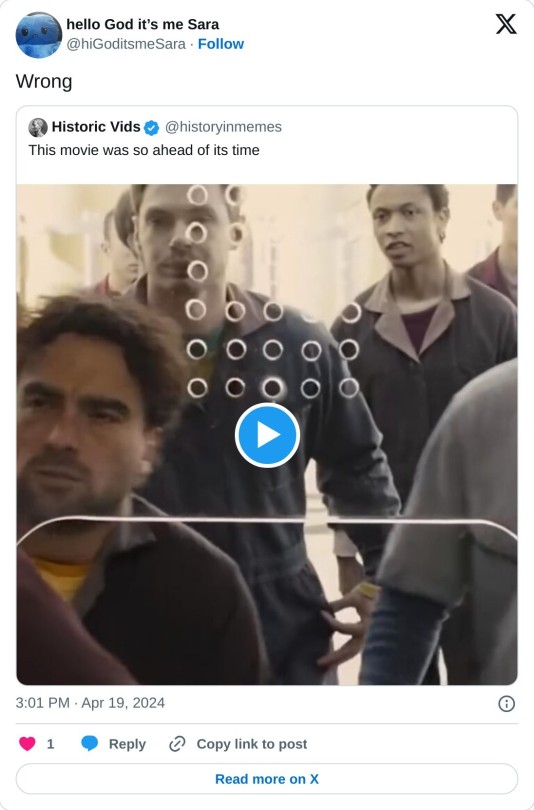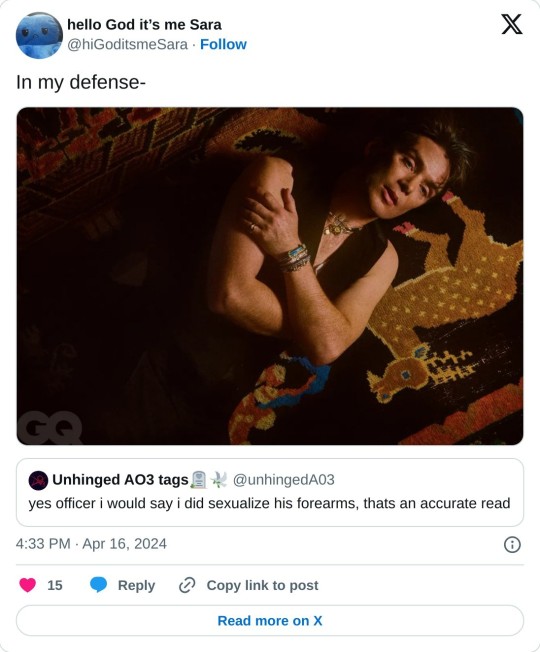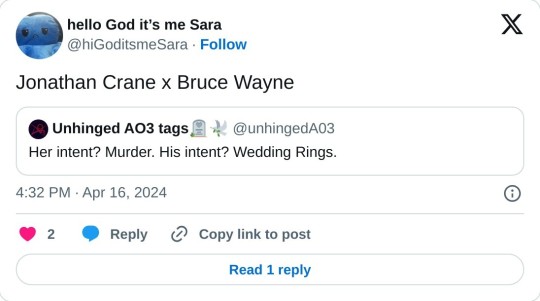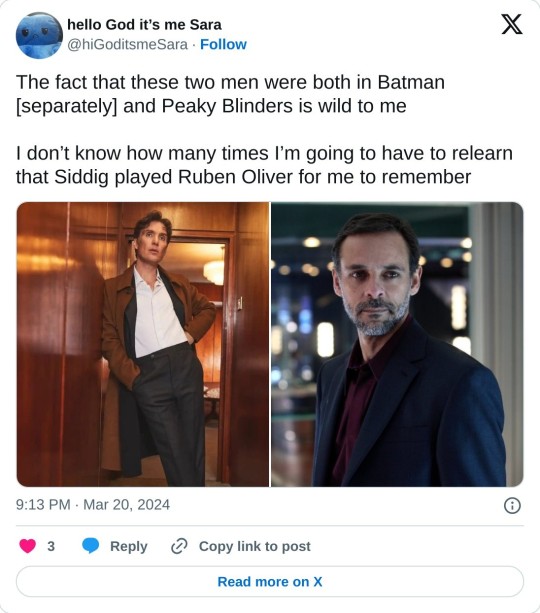Text


Bb death appreciation
18 notes
·
View notes
Text


I have too much time 🫠🫠🫠
6 notes
·
View notes
Text

Don’t even get me started because I will
1 note
·
View note
Text

May I plead the fifth
6 notes
·
View notes
Text

9 notes
·
View notes
Text


2 notes
·
View notes
Text

I’m joking but I’m also not
10 notes
·
View notes
Text
Southern Jonathan Crane and country music [question mark]
#what’re we thinking#I think he likes certain country music#older country music#do you think he knows any line dances#southern jonathan crane#jonathan crane
10 notes
·
View notes
Text



if i am remembered for anything let it be for how much i hate this movie
1 note
·
View note
Text
I will die mad over the fact that they waited till fucking season 3 to finally curl Grace’s hair right just to kill her in episode 2
7 notes
·
View notes
Text

do you see my vision
5 notes
·
View notes
Text

my two worlds literally collided and i can't ever remember it
so many batman connections
9 notes
·
View notes
Text
Yall Gotham TikTok is so fun
5 notes
·
View notes
Note
i kinda just wanna give tommy shelby a hug-
he is very pathetic and often quite huggable
8 notes
·
View notes
Text
hi i would just like to add an interracial adoptee's perspective to this as well since if you continue this will be an important point in your story [disclosure: i am a chinese adoptee of two white parents]
1. ADOPTION IS TRAUMATIC
it's a common misconception (that i myself used to hold) that children can be too young to experience trauma because they don't remember it, this is false
being separated from your biological parents, specifically your biological mother is severely traumatic for a baby
to add when you experience trauma that young, before you can even retain memories, you're just stuck with violent trauma that you can't fully cope with, i've had talks with my therapist about abandonment and separation anxieties i have and there's only so much we can do because it happened to be all before i was one years old
second- if it happens to you when you are that young, growing up you don't recognize it, it might be hard for other people to recognize it, it might manifest in uncommon ways making it harder to recognize. i don't have physical separation anxiety, i have emotional separation anxiety. i did sleepovers, i did summer camps, being away from my parents never bothered me as a kid. any type of family separation sent me into a full blown meltdown as a kid and still upsets [viscerally] me to this day. my parents didn't let me watch finding nemo for a while because the first time they put it on i unexpectedly started screaming, like a wailing breakdown. i don't even remember this i think i was so young. if i had to guess it was either when the barracuda ate the mom or when he got kidnapped
please to research into adoption trauma
2. people are super fucking shitty to adoptive families and it's worse and also weirder if the adoption is interracial
this of course is also dependent of the culture, i can only speak from a western/american experience where the idea of a nuclear family is still very strong
people are also nosy as fuck and if it's something you can't hide like interracial adoption you might as well have a neon sign over your head
as a child i had full grown adults try to mine at me for answers (they still ask by the way, i just think it's extra wrong to ask a child), why did my parents adopt, do i have any biological siblings, when they found out my parents didn't have biological children of their own they immediately assumed fertility issues and tried to get that answer out of me as well
people also act like your adoptive family is not a valid form of family, "real parents/family" is something i never want to fucking hear again in my life, "do you ever want to meet your real parents?", [i have a sister, also adopted] "is she your actual sister?"
also people don't believe that your parents are your parents. i never had this problem because white/asian adoption is so common in the states, but i have heard from other interracial adoptees that they've had people not believe that their adoptive parents were their parents, i could never imagine it
3. cultural dissociation/"transracialness"
despite the bastardization of the term 'transracial' by one british man, it was originally coined by interracial adoptees to describe the cultural/racial dissociation they felt being raised in a culture that did not align with their ethnicity. and honestly how better could i describe the feeling of being raised white, of having a majority white experiences, but being perceived asian by the rest of the world? unironically i "identify" as a white person, i "consider" myself white. and it's not been near as hard on me where my "white assimilation" is more accepted as an east asian person.
sometimes adoptive parents (i find usually white) ignore their children's ethnicity and try to raise them "colorblind", and sometimes they try to help a child reconnect with their heritage but it's just not the same
how the parents/family addresses the transracialness does affect the adoptee in major ways, is the wider adoptive family receptive to the adoptee and their different heritage? is it treated with respect? what kind of internalized bias could the adoptee pick up even if it's unintentional and/or non-malicious?
4. reunification
how does the adoptee handle being recconnected/reunited with his biological dad? you said the adoptive dad assumed the biological dad abandoned his son, does the son also share this opinion? how much does the son know about his adoption or his biological dad? how much has he wanted to reunite with his biological family both younger and now? has it changed? does the son also perceive the biological dad as a threat to his current family situation? do either dads feel a sense of entitlement over the son? do either dads listen to the son's opinions and feelings throughout the entire situation?
adoptees are not a monolith, we all have different situation and opinions on our adoption and out biological families. it is also heavily affected by the information we have on our adoptions, our biological families, and possibly most importantly our adoptive family's feelings toward our adoption and biological family. some kids are abandoned and/or feel abandoned and they want absolutely nothing to do with their biological family, sometimes they grow out of it, sometimes they carry it into adulthood. some kids want nothing more than to learn about their biological family and it gives them a great sense of grief and anxiety to have been given up by their biological parent/s. maybe they were abandoned and want answers, maybe they were left a little bit of information and feel like their biological family would be receptive to reuniting. no feeling or reason is invalid but please make sure to address and explore it because it plays such a huge role in the story.
personally i'm indifferent and have always been indifferent. i would be interested in finding my biological family but if i die never meeting them at the moment i can't say i would care. i was fortunate that my parents were very open about my adoption and the circumstances i was adopted under, they gave me all the information they had, did the best to answer my questions on it, when i was older we even went back to china, to the orphanage i stayed at, and attempted to look for more answers. the information we had was very limited and it will probably remain limited.
those were the main issues specifically pertaining to adoption that picked my head when i read this post, i'm also more than happy to further discuss :)
Desi Parenthood, Adoption, and Stereotypes
I have a story set in the modern day with supernatural traces, with three characters: a young boy, his bio dad, and his adoptive dad. The boy and his bio dad are Indian, the adoptive dad is Chinese.
The bio dad is one of the few people in the story with powers. He put his son up for adoption when he was a child because at the time he was a young single father, had little control of the strength of his powers: he feared accidentally hurting his child. The son is adopted by the other dad, who holds spite to the bio dad for giving up his son since he lost his father as a young age and couldn't get why someone would willingly abandon their child.
This also results in him being overprotective and strict over his son. When the child is older, the bio dad comes to their town and the son gets closer to him, which makes the adoptive dad pissed, mostly acting hostile to the other guy, paranoid that he'll decide to take away the child he didn't help raise. Later when they get closer he does change his biases.
I can see the possible stereotypes here: the absent father being the darkskinned character, the light-skinned adoptive dad being richer than the bio dad, the lightskinned character being hostile and looking down on the darkskinned character, the overprotective asian parent, the adoptive dad assuming the bio dad abandoned the son. The reason for his bias isn't inherently racist, but I get how it can be seen that way. Is there a way to make this work? Would it be better to scrap it?
Two problem areas stand out with this ask:
You seem confused with respect to how racial stereotypes are created, and what effect they have on society.
Your characterization of the Indian father suggests a lack of familiarity with many desi cultures as they pertain to family and child-rearing.
Racial Stereotypes are Specific
Your concern seems to stem from believing the absent father trope is applied to all dark-skinned individuals, when it’s really only applied to a subset of dark-skinned people for specific historical/ social/ political reasons. The reality is stereotypes are often targeted.
The “absent father” stereotype is often applied to Black fathers, particularly in countries where chattel slavery or colonialism meant that many Black fathers were separated from their children, often by force. The "absent black father" trope today serves to enforce anti-black notions of Black men as anti-social, neglectful of their responsibilities, not nurturing, etc. Please see the WWC tag #absent black father for further reading.
Now, it’s true many desis have dark skin. There are also Black desis. I would go as far as to say despite anti-black bias and colorism in many desi cultures, if one was asked to tell many non-Black desis from places like S. India and Sri Lanka apart from Black people from places like E. Africa, the rate of failure would be quite high. However, negative stereotypes for desi fathers are not the same as negative stereotypes for non-desi Black fathers, because racially, most Black people and desis are often not perceived as being part of the same racial group by other racial groups, particularly white majorities in Western countries. Negative stereotypes for desi fathers are often things like: uncaring, socially regressive/ conservative, sexist. They are more focused around narratives that portray these men as at odds with Western culture and Western norms of parenting.
Desi Parents are Not this Way
Secondly, the setup makes little sense given how actual desi families tend to operate when one or both parents are unable to be present for whatever reason. Children are often sent to be raised by grandparents, available relatives or boarding schools (Family resources permitting). Having children be raised by an outsider is a move of last resort. You make no mention of why your protagonist’s father didn’t choose such an option. The trope of many desi family networks being incredibly large is not unfounded. Why was extended family not an option?
These two points trouble me because you have told us you are writing a story involving relationship dynamics between characters of both different races and ethnicities. I’m worried you don’t know enough about the groups you are writing about, how they are perceived by each other and society at large in order to tell the story you want to tell.
As with many instances of writing with color, your problem is not an issue of scrap versus don’t scrap. It’s being cognizant of the current limits of your knowledge. How you address this knowledge deficit and its effect on your interpretation of your characters and the story overall will determine if readers from the portrayed groups find the story compelling.
- Marika.
I have one response: what? Where are the father’s parents? Any siblings? Is he cut off? Is he American? A Desi that has stayed in India?
Estrangement is not completely out of the question if the father is Westernized; goodness knows that I have personal experience with seeing estrangement. But you haven’t established any of that. What will you add?
-Jaya
480 notes
·
View notes

